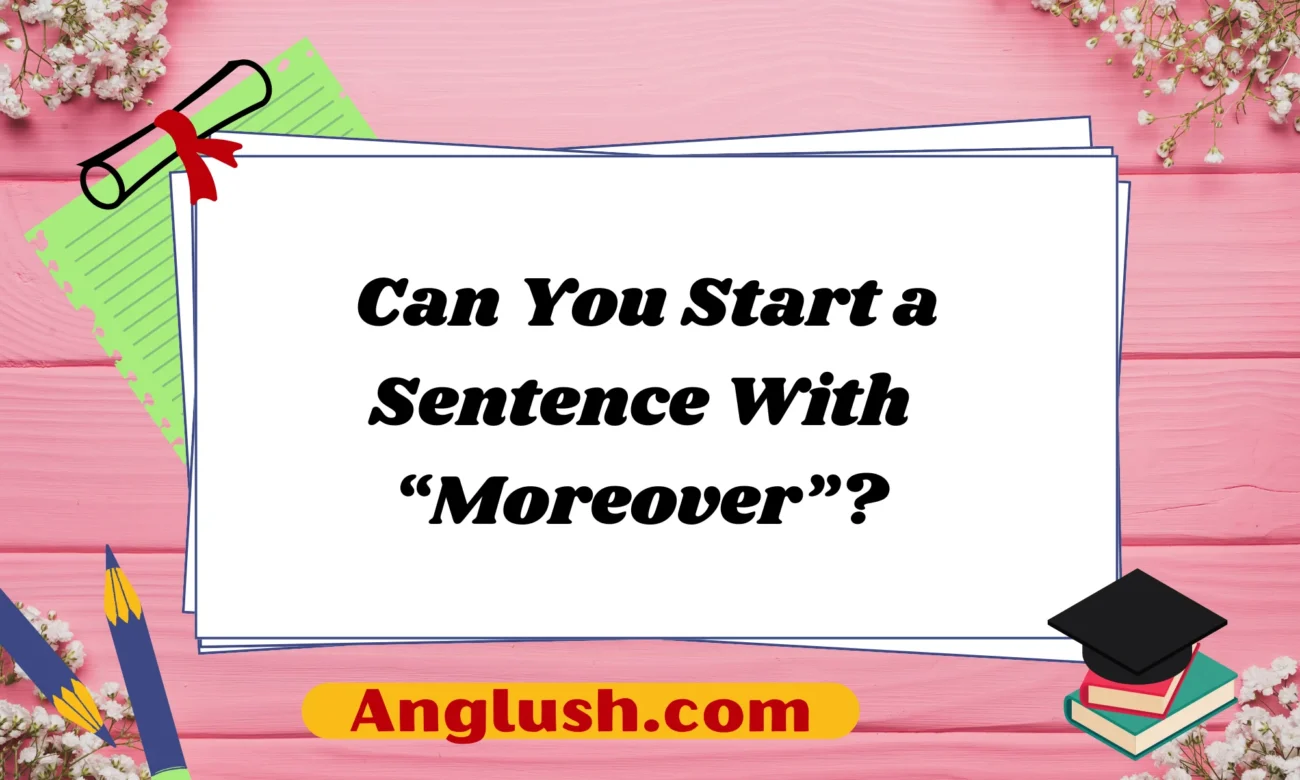Introduction
The English language is full of transition words that help connect thoughts smoothly, and “moreover” is one of them. Many writers wonder if it’s appropriate to start a sentence with “moreover.” The short answer is yes, but there are other ways to express the same idea.
This article will explore various polite, professional, and casual alternatives to “moreover,” offering readers a variety of options depending on the tone, formality, and context of their writing. Whether you’re drafting an academic paper, composing a business email, or sending a text to a friend, this guide will help you use the right transition word with confidence.
Can You Start a Sentence With “Moreover”?
Yes, you can start a sentence with “moreover.” It is a transition word used to add extra information while emphasizing its importance. However, “moreover” tends to sound formal and may not always be the best choice for casual writing.
Here’s an example of how “moreover” works at the beginning of a sentence:
“The company has increased its revenue this quarter. Moreover, customer satisfaction has reached an all-time high.”
While this is grammatically correct, in many cases, a different transition word or phrase might sound more natural.
20+ Alternatives to “Moreover”
Below are different words and phrases that can replace “moreover,” categorized based on tone and context.
1. Formal and Professional Alternatives
These alternatives are ideal for academic writing, reports, business emails, and other professional contexts.
1.1 Furthermore
“The new policy improved efficiency. Furthermore, it reduced overall costs.”
“Furthermore” is a strong, professional alternative to “moreover” that emphasizes additional points.
1.2 In Addition
“The team met its deadlines. In addition, they exceeded quality expectations.”
This phrase is clear, professional, and works well in both formal and semi-formal contexts.
1.3 Additionally
“The study confirms the theory. Additionally, it provides new insights into the subject.”
“Additionally” sounds slightly more modern than “moreover” and is common in business and academic writing.
1.4 Not Only That
“The project was completed early. Not only that, but it also came under budget.”
This phrase adds a conversational yet still professional touch.
1.5 What’s More
“The software update fixed major bugs. What’s more, it introduced new features.”
A slightly informal but still professional way to add emphasis.
2. Polite and Neutral Alternatives
These options work well in emails, essays, and general conversations where you want to sound polite but not overly formal.
2.1 Besides That
“He is a great team leader. Besides that, he mentors junior employees.”
“Besides that” sounds neutral and conversational.
2.2 On Top of That
“The event was well-organized. On top of that, the speakers were engaging.”
A friendly, natural alternative to “moreover.”
2.3 Plus
“She finished her work early. Plus, she helped her colleagues.”
“Plus” is simple, casual, and easy to use.
2.4 Over and Above That
“The company offers great benefits. Over and above that, it provides flexible hours.”
A unique way to emphasize additional benefits.
3. Casual and Conversational Alternatives
These alternatives are best suited for informal writing, texting, and friendly conversations.
3.1 Also
“We had a great dinner. Also, the dessert was amazing!”
“Also” is a very simple and widely used alternative.
3.2 And Besides That
“We watched a great movie. And besides that, we had a fun time catching up.”
This phrase is perfect for casual speech and writing.
3.3 To Top It Off
“The weather was great. To top it off, we found a fantastic café.”
A fun, engaging way to add extra emphasis.
3.4 Another Thing
“The hotel was luxurious. Another thing, the service was outstanding!”
This sounds very conversational and friendly.
3.5 If That’s Not Enough
“The concert was fantastic. If that’s not enough, we even got to meet the band!”
A dramatic, engaging way to add more excitement.
How to Choose the Best Alternative
The best alternative depends on the tone and context of your writing:
- For formal and academic writing: Use “furthermore,” “in addition,” or “additionally.”
- For business and professional emails: Try “not only that” or “besides that.”
- For casual writing and texting: Use “plus,” “also,” or “to top it off.”
15 Texting Examples Using Alternatives to “Moreover”
- “That restaurant was amazing. Plus, the service was super fast!”
- “The movie was great. Also, the ending was unexpected!”
- “I finished all my work early. And besides that, I helped my team too!”
- “She’s super kind. What’s more, she’s always there when you need her.”
- “I bought a new phone. On top of that, I got a huge discount!”
- “We had a blast at the concert. If that’s not enough, we met the lead singer!”
- “The vacation was incredible. To top it off, the weather was perfect!”
- “He’s a great teacher. Not only that, but he makes learning fun!”
- “I love this city. Besides that, the people here are so friendly.”
- “The hotel was beautiful. Another thing, the food was amazing!”
- “I finished my essay early. Over and above that, I got an A!”
- “The party was fun. And guess what? The DJ was awesome!”
- “The hike was amazing. Plus, we saw a beautiful sunset!”
- “We found a cute café. What’s more, they had the best coffee!”
- “The game was intense. If that’s not enough, our team won!”
Conclusion
While “moreover” is a correct and useful transition word, it often sounds overly formal or outdated in casual writing. By using alternatives like “furthermore,” “in addition,” or “on top of that,” you can make your writing more engaging and natural.
The key is to match the word choice to the tone of your writing. Formal contexts call for more professional transitions, while casual conversations benefit from simpler alternatives.
Next time you’re about to use “moreover,” consider switching it up with one of the many options listed in this article!

